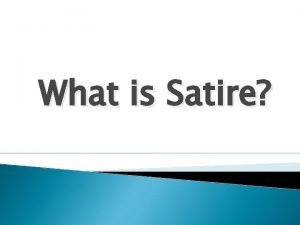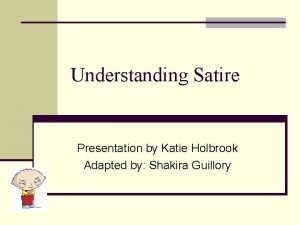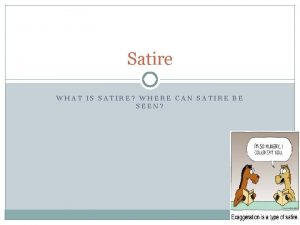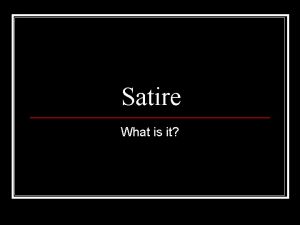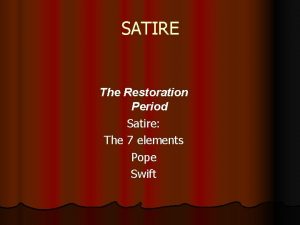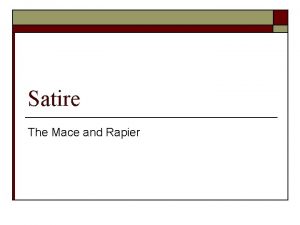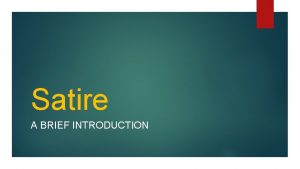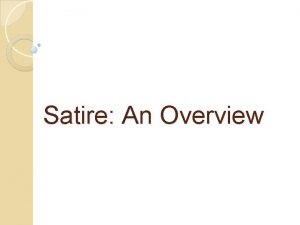Introduction to Satire Satire What is satire A


















- Slides: 18

Introduction to Satire

Satire What is satire? ▫ A kind of writing that ridicules human weakness, vice or folly in order to bring about social reform

Elements of Satire • • • Exaggeration Hyperbole Understatement Irony Sarcasm

Parody • If satire is… ▫ A kind of writing that ridicules human weakness, vice or folly in order to bring about social reform • What is parody? ▫ The imitation of a work of literature, art or music for amusement or instruction

Satire/Parody • In many cases, satire and parody overlap, but a satire is not always a parody. • A satire does not have to be comedic, while a parody almost always has some bit of humor involved in its creation. • Parodies imitate their subject, while imitation is not necessary in a satire. Writing. com

Examples of Satire • • • The Simpsons Family Guy South Park Scrubs Political Cartoons

Examples of Parody • "Weird Al" Yankovic • Scary Movie • Shrek

Aristotle and Persuasion

Aristotle • 384 – 322 BC • Greek philosopher

Aristotle’s three Methods of Appeal • The “methods of appeal” or “modes of persuasion” are devices in rhetoric that classify the speaker's appeal to the audience. • Three Methods 1. Ethos Credibility/reputation of the speaker is the appeal 2. Logos Appeal to logic/statistics 3. Pathos Appeal to emotions

Ethos (Ethics) • Ethos Site

Ethos (Ethics) • Back to reality - ACME is not a real company, contrary to popular belief. It's something we made up to use as an example of Ethos. The ACME homepage is an example of ethos because of the way it keeps referring back to the character of ACME is a company that "you have trusted for over 100 years. " They even have a “spokesperson” vouching for their integrity.

Logos (Logic) • Logos Site

Logos (Logic) • Logos is an argument based on logic or reason. The ACME Research page is primarily logosbased because it appeals to the reason of people reading it. It suggests that Cesium will provide the world's energy for a very long time. It is clean, safe, and efficient, all of which are appeals to the logic and reasoning abilities of the audience. By using such convincing reasons in its argument, ACME hopes to provide the world's energy.

Pathos (Emotion) • Pathos Site

Pathos (Emotion) • Pathos is an argument based on emotion, playing on sympathy, fears, and desires. The Say "NO!" To Acme! page is pathos-based because it relies on an emotional response from the people reading it. By stressing the helplessness of the (endangered) turtle, it attempts to sway people to its side, against the "commercial hordes" of Acme.

Aristotle’s three Methods of Appeal 1. Ethos Credibility/reputation 2. Logos Logic 3. Pathos Emotions

Closure • Questions ▫ What is satire? ▫ What is parody? ▫ What are Aristotle’s three Methods of Appeal?
 Shrek satire examples
Shrek satire examples Body paragraph
Body paragraph Technique of satire
Technique of satire What is satire in literature
What is satire in literature Satiregram meaning
Satiregram meaning The three golden questions of satire are:
The three golden questions of satire are: Mr collins satire
Mr collins satire Which statement best describes the satire in the excerpt?
Which statement best describes the satire in the excerpt? Analyze this picture
Analyze this picture Gatsby historical background
Gatsby historical background Satire advertisement
Satire advertisement Satire examples in literature
Satire examples in literature Shrek plot summary worksheet answers
Shrek plot summary worksheet answers Family guy satire analysis
Family guy satire analysis Indirect satire definition
Indirect satire definition Satire
Satire What does satire mean
What does satire mean Restoration satire
Restoration satire What is satire? *
What is satire? *


